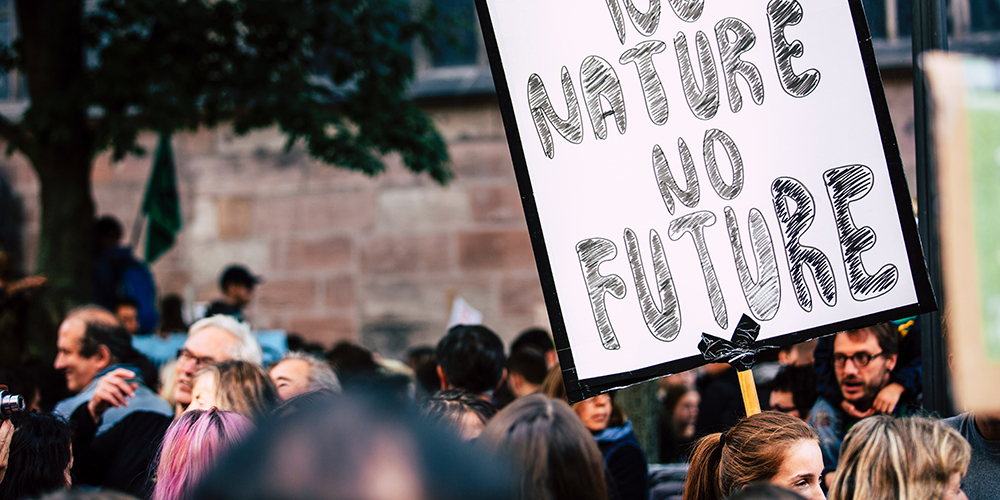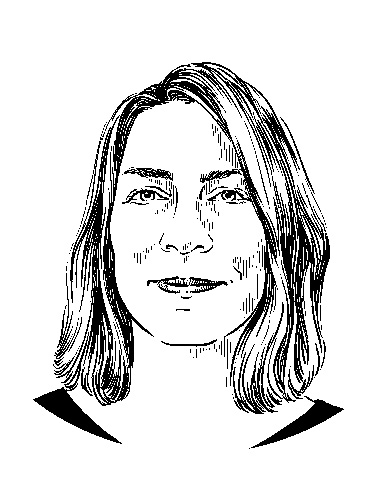Dreaded future.
Interview: Angelika Jacobs
Psychologist Karina Wahl studies rumination. We have plenty of reasons to worry about what the future will bring. A discussion about constructive ways to handle our fears about what is to come.
UNI NOVA: Karina Wahl, when you think about the pandemic, inflation, the climate crisis... what feelings do those things invoke?
KARINA WAHL: I try to avoid dwelling constantly on these types of things, but when I do think about them, I feel an oppressive sense of worry.
UNI NOVA: The acute phase of the pandemic may be over, but we are already experiencing the unmistakable consequences of climate change. Climate activist Greta Thunberg has said that “our house is on fire.” What impact does that have on the human psyche?
WAHL: To answer that question, let me first give you some broader context. Researchers have been looking at the direct effects of climate change for a long time, but the indirect effects have only been studied for the past 10 or 15 years.
UNI NOVA: What do you mean by “indirect effects”?
WAHL: For example, in regions that are heavily impacted by climate change, we observe an increase in anxiety, depression, substance abuse and other mental disorders. Those are the direct effects of a changing environment on the human psyche. Indirect effects are the worries and fears that climate change activates even in individuals who are not currently experiencing as many of the direct effects. But this research is still in its infancy, and we have very little data to indicate how widespread this climate change anxiety is and what forms it might take.
UNI NOVA: How is this climate change anxiety expressed?
WAHL: Experts have not reached a final consensus on the issue. Climate change anxiety not only encompasses the more specific manifestations of anxiety; it also includes feelings such as anger, sadness, helplessness, frustration or even a sense of having been betrayed by governments that fail to act. There are a number of terms in circulation, such as “eco-anger,” which describes the rage we feel about climate change, or “ecological grief,” which refers to our despair at the loss of places we love as they are destroyed by changes in the environment.
UNI NOVA: Young people are leading the charge in the Fridays for Future movement. To what extent is this climate change anxiety present in society as a whole?
WAHL: That is a difficult question to answer, because past surveys on the topic focused mainly on young people. For example, British researchers published the findings of a global survey of young people in which around two thirds of respondent reported feeling worried or extremely worried about climate change. Only a third of those approached were either not worried or only a little worried. It is logical for young people in particular to be worried, because they will have to live with the consequences of climate change for longer.
UNI NOVA: The pandemic has caused public attention to temporarily shift away from the climate crisis. But the Covid-19 pandemic seems to have had a greater psychological impact on young people, too. Can we draw parallels between the two issues?
WAHL: I can only speculate on that point, but of course both involve an uncertain future. Older people have established solid careers and created a stable lifestyle for themselves while young people are still searching for their own path in life. Under those circumstances, the chronic stress associated with the pandemic and the climate crisis constitute a huge psychological burden. An intolerance for uncertainty is at the core of many fears, although some individuals experience it to greater or lesser degrees.
UNI NOVA: Can you explain that in a bit more detail?
WAHL: It is normal for there to be a little uncertainty in life. Some people are not troubled by it or even perceive it as exciting or energizing, while others find uncertainty highly stressful. Possibly, they harbor the negative, distorted belief that they must eliminate every last bit of uncertainty before they will be able to lead a worry-free life. Uncertainties and the consequences they have on our individual lives play a major role in both climate change and the pandemic. Individuals for whom coping with uncertainty is extremely difficult may be particularly inclined to experience severe anxiety and worry related to both of these phenomena.
UNI NOVA: How does that affect people who have difficulty coping with insecurity?
WAHL: One typical response is to try and achieve a sense of security, whether or not such attempts actually prove effective. But this can even be counterproductive. If you’re constantly seeking reassurance that nothing bad is going to happen, you may pass on your own insecurities to others. There is a phenomenon in which people escalate their problems through excessive discussion that experts in the field refer to as “co-rumination.” This can ultimately increase their feelings of hopelessness. To put that in the context of our discussion on climate anxiety: Imagining worst case scenarios can be paralyzing.
UNI NOVA: What can we do to escape that trap?
WAHL: When our worrying gets out of hand, we need to ask ourselves: Are my concerns focused on an actual problem that is based in reality, or are they vague and abstract? If the former is true, the next step is to identify strategies to solve the problem that focus on mitigating whatever is causing us to worry in the first place. If the latter is true, the goal is to implement strategies for dealing with excessive worry.
UNI NOVA: Could you provide an example?
WAHL: Let’s say I’m worried about whether or not I will graduate high school; this is a manageable problem. I can just calculate my grade point average to give me a realistic picture of my chances. And if they’re less than ideal, I can work to improve them. Climate change, too, is a real problem. A constructive way to mitigate the causes of the problem might be, for example, to reduce my carbon footprint or participate in demonstrations to demand more ambitious climate policies. When we get involved, we meet others who share our views. Then we can join forces to nurture the sense that we can really make a difference. The key thing is to define our objective in terms of concrete steps and identify which problems can be solved and which cannot.
UNI NOVA: But in the case of climate change, it’s hard for me, as a non-expert, to answer those questions – and many problems are too big for individuals to solve on their own.
WAHL: Exactly. Climate change anxiety also has this second component. Excessive worry over intractable problems requires a different kind of solution. One thing that can help is keeping a worry diary. Worrying can be like a habit – it happens automatically. So, the first step might be to identify the situations that spark the concern. Then you can learn different ways to manage those situations, for example by examining them more closely, noting your responses to them and working to gradually shift your focus toward the things you can change and accomplish. This helps turn abstract worries into concrete actions. Another strategy involves a radical acceptance of uncertainty.
UNI NOVA: Following the pandemic and the climate crisis, we’re now faced with a war in Ukraine. How do you personally handle chronic uncertainty in life?
WAHL: I stay informed and discuss the issues with my husband, friends or colleagues. This helps me to limit how much I dwell on things. At the same time, it’s important to accept that we’ll never completely eradicate our uncertainties about the future. Or to put it differently I try to increase my tolerance for uncertainty.
More articles in the current issue of UNI NOVA.


